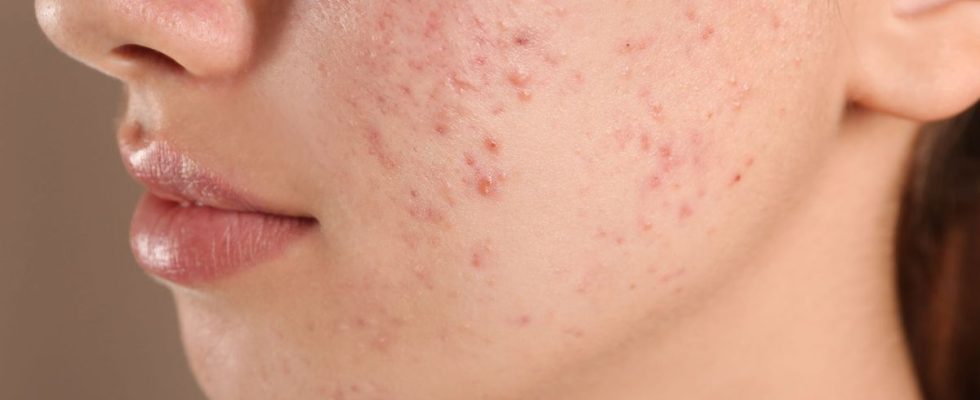Published on
Updated
Reading 2 mins.
in collaboration with
Marie Jourdan (Dermatologist)
According to a Franco-American study, having acne would be good for the skin. Indeed, the bacterium that causes this dermatological condition also produces many substances essential to the good health of our epidermis. The explanations of Dr Marie Jourdan, dermatologist member of the committee of experts of Doctissimo.
Mainly affecting teenagers, sometimes adults, acne is a condition of the skin of the face, which although unsightly, would be good for the skin, according to a study.
Bacteria that produce essential substances for the skin
Scientists studied human skin cells – called keratinocytes – by exposing them to different bacteria including Cutibacterium acneswhich is implicated in acne in humans. “An analysis of the response of human keratinocytes to several different commensal bacteria on the skin revealed that Cutibacterium acnes induces a large increase in essential lipids, including triglycerides, ceramides, cholesterol and free fatty acids” note the scientists. “A similar response occurred in mouse epidermis and in acne-affected human skin.” add the researchers.
A bacterium that protects the skin… when it does not cause acne
Thus, this bacterium would somehow protect our skin, when it is not involved in the inflammatory process that causes acne.
When asked, Dr. Marie Jourdan, dermatologist and member of Doctissimo’s expert committee, notes that this study demonstrates the importance of the skin’s microbiome. “We now know that the skin is a living organ, that bacteria are present on normal skin and that they are saprophytic bacteria. On the contrary, an imbalance of this microbiome causes certain pathologies, such as acne in the example of Cutibacterium acnes” explains the specialist.
Rebalancing the skin flora to treat certain pathologies
According to Marie Jourdan, during an acne outbreak the bacteria Cutibacterium acnes “being present in too large quantities, takes part in an inflammatory cascade which generates an excess of irritating and oxidizing sebum for the skin, which causes pimples and redness”.
For the dermatologist, healthy skin “is therefore not sterile skin, but skin whose microbiome is balanced”. And the treatment of certain skin pathologies goes through “the rebalancing of this skin flora“.
5 tips to take care of your skin flora in case of acne
In case of acne, the skin is weakened and it is important to respect it as much as possible in order to rebalance this skin flora. This involves small, simple everyday gestures, as Marie Jourdan reminds us:
- “Be careful not to strip your skin, by washing your face too much, because excessive hygiene will have a counterproductive effect on acne;
- It is necessary to use suitable cosmetic products, in particular moisturizing creams, because the skin needs to be hydrated. They should not be avoided under the pretext of creating an excess of sebum. The treatments are astringent and the skin must be properly hydrated after use;
- It is important to use treatments that will fight the biofilm around acne-causing bacteria, a biofilm that protects them;
- On a daily basis, you must avoid touching your face as much as possible, so as not to contaminate yourself with pathogens present on your hands;
- Finally, it is absolutely inadvisable to scratch the wounds or the pimples, because there is a major risk of superinfection, by staphylococci in particular”.
